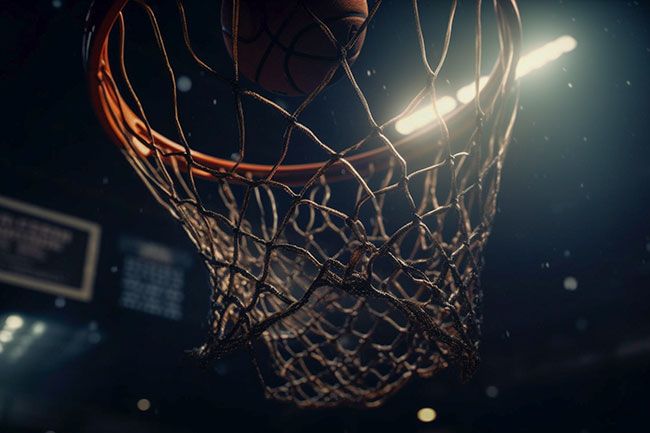Kirby Neumann-Rea: Embrace of sports gambling puts NBA on a perilous path

About the writer: Kirby Neumann-Rea has followed basketball all his life, plays hoops two or three days a week, and in 2021 wrote about his “basketball tour” of local outdoor courts. He had moved to McMinnville that year to work as managing editor of the News-Register. He retired in April, but still writes for the News-Register about local quirk.
So, sports fans, what’s the role of the NBA in this era of codified sports gambling?
Does it just serve as an athletic league for the exhibit of the finest examples of the game? An entertainment venue? A business? Or a gaming enterprise disguised as a business? With viewership declining, has the idea become that people will tune in just to track their bets?
These are questions worth asking as the league enters its “second season,” the already-dramatic high-stakes series of games that will last from now until about the time your kids get out for summer break.
It’s high stakes in more ways than one. In fact, the recent rise of active and heavily promoted fan betting on games raises serious questions about the continuing validity of the NBA. As such, the league is sullying society.
Full disclosure:
I’m a basketball nut, and as such, an avid viewer of as many NBA games as possible. I’m a student of the game and admirer of the — for the most part — excellence and sophistication of the sport.
Yet as a long-time fan, I’ve long advocated for two drastic steps the league could take to improve the game: raise the rim to 11 feet and lengthen and widen the court itself.
When James Naismith set out the rules and dimensions of the court 134 years ago, not only were people physically smaller, but the game was nowhere near as fast and physical as it has evolved into today. Naismith could not have foreseen the strength, speed and skill that defines the modern game.
Just as years back the NFL moved the goalposts off the goal line and MLB altered the height of the pitching mound, the NBA needs to adjust its dimensions to accommodate new realities. But hiking the rim could serve to diminish dunking, a fan favorite, and enlarging the court would mean loss of lucrative courtside seats, along with the revenue they generate.
Understood:
Pipe dreams sometimes have to remain in the pipe. Revenue is sacrosanct, no small part played by the athletes who have come to demand higher and higher salaries.
It’s what happens off the court that concerns me more in any event. Another, darker form of revenue points to a bigger problem with the game: the rise of gambling.
“With people able to place bets on games or on their phones, and the focus shifting from fandom to financial for so many observers,” Sam Amick and Josh Robbins wrote April 22 in The Athletic, “the athletes’ experience during games and online has often become toxic along the way. The controversy has extended beyond the court, too.”
They continued, “For a significant segment of players who are merely trying to do their jobs as best they can, there’s another destructive element to all this. Some fans who’ve lost bets take their frustrations out on players online. In most extreme cases, players have received death threats. It’s part of the dark side of the lucrative cash cow that is sports gambling.”
Amick and Robbins cite how the NBA recently investigated, and cleared, a well-known player on suspicion of affecting games. And that came not long after its unprecedented lifetime ban on player Jontay Porter.
Years earlier, it banned a referee for allegedly making calls to suit bettors. The players don’t have to throw a game, as parlays have come to deal with granular statistics, including total rebounds and points per half.
Major League Baseball faced its own gambling crisis when the late Pete Rose turned out to be betting heavily on games, even games involving his own team, after ending a celebrated playing career and moving into management ranks. He was permanently banned from baseball as a result.
Now, the NBA and its wingman ESPN have not just allowed gambling, but embraced it — declared it “part of the fan experience” and vaunting its powers of “viewer engagement.”
Euphemisms on the march.
Of course, few call it gambling. Bets and betting are considered marginally acceptable, but generally the league and the gambling arms spin it with words such as parlay, fan and, laughably, “sports book.” All this is meant to district from the fact that people are putting down money on these games.
Ads for the betting outfits took their place in the Big Four B of commercials alongside beer, burgers and big trucks. The betting ads now are big and bright, while for a time it was like they came in a plain brown wrapper.
And now, “place your bets” talk happens even during game coverage, breaking in during announcers’ talk.
Parley, meet Parlay.
If that intermingling is happening in the open, over the air, you can imagine what could well be happening off the court and online. If one player got banned, it’s likely others have committed similar violations. And the more people who get involved, the more likely for temptation to get the better of them.
“There’s a lot of inside work going on that you don’t see,” said a player The Athletic surveyed in an anonymous player poll. Other comments included: “People stop watching us for what we do and only to make money for themselves” … “People are caught up in the gambling and are hassling the players” … “It’s a money drip” …
“The gambling partnerships are horrible for the league,” one player stated, “because you guys are selling your soul for the worst types of people in your fan base, and they don’t see us as human beings anymore …”
The solution? It might be none is available.
To borrow from basketball parlance, how do you box out Pandora’s Box?
The reality is, even if you do away with the betting services, the betting will still go on. The Fix Is In.
But at the very least, the league can disassociate itself from the services and insist, contractually, that ESPN do the same. The revenue loss would be great, but what’s the price of the soul of the game?








Comments
Don Dix
The NBA has it's own version of what constitutes basketball, and the actual rules of the game are watered down to fit the script.
The most blatant example is the act of dribbling - it is only legal to control the ball from the top while dribbling. Not from the side or underneath. Nearly every player 'carries the ball' simply walking up the court with the ball, if you pay attention.
Another is 'traveling'. The NBA and FIBA allow 2 steps after picking up the dribble - 2 steps is traveling in the NCAA (as the rules were written). Allowing 2 steps requires the pivot foot to be lifted and placed elsewhere on the court - but the pivot foot cannot be moved from it's original spot without releasing the ball (pass, shoot, dribble). It is not unusual for an NBA player to 'pivot' his way from the free throw line all the way to the rim without any violation (sliding pivot foot along the floor). And usually that takes more than 3 seconds, which is a lane violation on top of traveling.
The NBA could be considered 'athletic entertainment', and many of the players are extremely talented high flyers -- but could they perform their skills so adeptly without the league 'tweaking' the original rules?